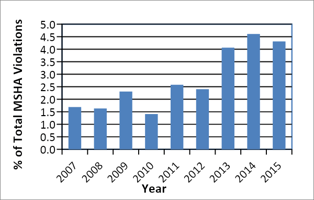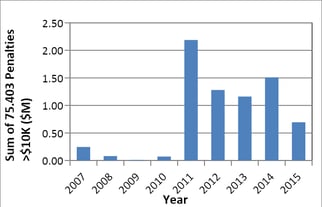RJ Lee Group 4 min read
A Cost-Effective Alternative to MSHA Total Incombustible Content (75.403) Citations
Contributors
RJ Lee Group
Subscribe to our newsletter
Since 1977, the Mine Safety and Health Administration (MSHA) has been implementing mining regulations to enhance coal mine safety. Over the past ten years, the number of citations issued for many violation categories has decreased significantly because of increased compliance and because of the decreasing number of active mines (http://www.msha.gov/STATS/Top20Viols/top20home.asp)
One violation category that does not follow this trend is total incombustible content (Standard 75.403). The number of citations issued for total incombustible content (TIC) more than doubled after the Upper Big Branch tragedy in 2010 and the implementation of the (TIC) has increased from the ninth most issued citation in 2007 to the third or fourth most issued citation. It now accounts for 4-5% of the citations issued by MSHA and is exceeded in number by only Combustible Material (75.400) and Ventilation (75.370) citations.

(https://etda.libraries.psu.edu/paper/10639/6004)ste ) indicates that Pennsylvania coal mines were fined $88,931 for 75.403 violations in 2006. By 2008, the 75.403 penalties assessed on Pennsylvania coal mines had increased more than tenfold to $969,229. The magnitude of individual penalties has also increased. In 2005 and 2006, none of the 75.403 violations exceeded $10,000. By 2014, the proposed penalties for sixty-three individual MSHA 75.403 violations exceeded $10,000. The total proposed penalties for these sixty-three citations exceeded $1.5 million dollars, an average of nearly $24,000 per violation.
Failure to comply with the new provisions of standard 75.403 can result in S&S-designated citations and in expensive penalties, particularly if the violations are repetitive. Moreover, inadequate rock dusting endangers the health and safety of miners and exposes mining infrastructure to the risk of severe damage.

Periodic collection of rock dust samples for analysis by MSHA method MH 102 is a cost-effective means of assuring compliance with standard 75.403, thereby minimizing citations while protecting mine infrastructure and miner health and safety. Independent analysis of sample splits from MSHA cited locations are an essential means of evaluating the accuracy of MSHA results, particularly in the 78-82 weight percent incombustible content range where inherent error in method MH-102 can mean the difference between compliance and a citation. Accurate analysis and proper documentation of quality control are of paramount importance when contesting a citation and preparing for resulting litigation.
RJ Lee Group has been providing Total Incombustible Content testing services for the mining industry for several years. Program participants report a reduction in the number and magnitude of 75.403 citations. Participants also note the value of RJ Lee Group TIC results and of RJ Lee Group technical support when contesting MSHA citations. RJ Lee Group has provided the technical support required to successfully vacate or reduce MSHA 75.403 citations, particularly those in the 78-82 weight % range where MSHA provides no allowance for sampling and measurement error.
To obtain additional information or to establish a RJ Lee Group Total Incombustible Content service program for your facility, please contact us.

